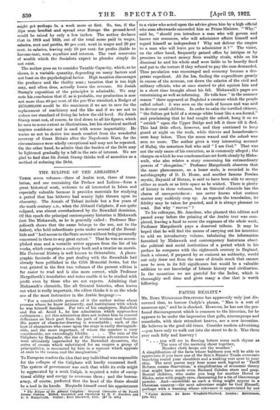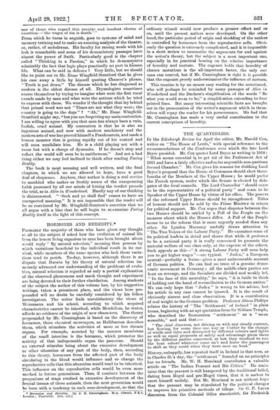FACING REALITY.*
Ma. Essm WINGFIELD-S'rRATFORD has apparently only just dis- covered that, to borrow Carlyle's phrase, " Man is a sort of nauseous ape," and he is shocked. However, he has not the pro- found discouragement which is common to the historian, for he appears to be under the impression that gulls, nincompoops and numskulls, with their attendant knaves, are a new invention. He believes in the good old times. Consider modern advertising you have only to walk out into the Street to do it. Was there ever such folly and knavery
. . . you will see in flaming letters some such rhyme as ' The sons of the morning shout together,
Mender cloth keeps out the weather.'
A simplification of the facts whose baldness you will be able to appreciate if you have one of the firm's Rainex'Truda overcoats bunching round your shoulders and a soaking vest next to your akin. The next poster may bear some such legend as Tariff Reform means Starvation,' a simplification of economic 'theory that might have made even Richard Cobden stare and gasp. Bestial children, who make you long for another Herod or Elisha, arise with-goggle eyes, clamouring for a tin of blancmange powder. And—incredible as ,such -a -thing -might appear in a Christian country—the next advertiser might be God Himself, perhaps with a warning whose relevance is appreciated by not • Facing Reality. BY Home Wingfield-Stratford. London; Hutchinson., flOs. 817
one of those who regard this maniac and insolent chorus of assertion= the wages of sin is death.' "
From which he turns in anguish, goes to systems of- mind and memory training and to make an amusing analysis of the theatre, or, rather, of melodrama. His faculty for raising weals with his lash is remarkable and some of his denunciatory passages have almost the power of Swift. Particularly good is the chapter called " Thinking in a Passion," in which he demonstrates admirably the fact that logic playa practically no part in human life. What can be said in defence ? Very little, but we should like to point out to Mr. Esme Wingfield-Stratford that he gives his case away a little by himself quoting Chaucer's phrase, Truth is put down." The disease which he has diagnosed as modern is the oldest disease of all. Etymologists sometimes amuse themselves by trying to imagine what were the first vocal sounds made by man and what were the notions which he tried to express with them. We wonder if the thought that lay behind that primal word was not "Times are not what they were; the country is going to the dogs " ? "Ah," Mr. Esme Wingfield- Stratford might say, "but you are forgetting my main contention. I am willing to agree with you that man has always been a vain, foolish, cruel animal. My contention is that he is also an ingenious animal, and now with modern machinery and the modern arts of war has proved himself a Frankenstein, and made a brazen monster that is getting rapidly out of his control and will soon annihilate him. He is a child playing not with a razor but with a charge of dynamite. If he doesn't stop and reflect the world will soon be in smithereens." And not a bad thing either we may feel inclined to think after reading Facing Reality.
The book is most amusing and well written, and the final chapters, in which we are allowed to hope, have a good deal of eloquence. Anyhow, that author is doing a real service to mankind who makes us freshly aware of the exasperating habit possessed by all our minds of letting the verdict precede the trial, as in Alice in Wonderland. Hardly any of our thinking is disinterested. " Seek and ye shall find' comes to have an unexpected meaning." It is not impossible that the reader will be so convinced by Mr. Wingfield-Stratton's assertion that we all argue with a bias that he will begin to re-examine Facing Reality itself in the light of this concept.



































 Previous page
Previous page